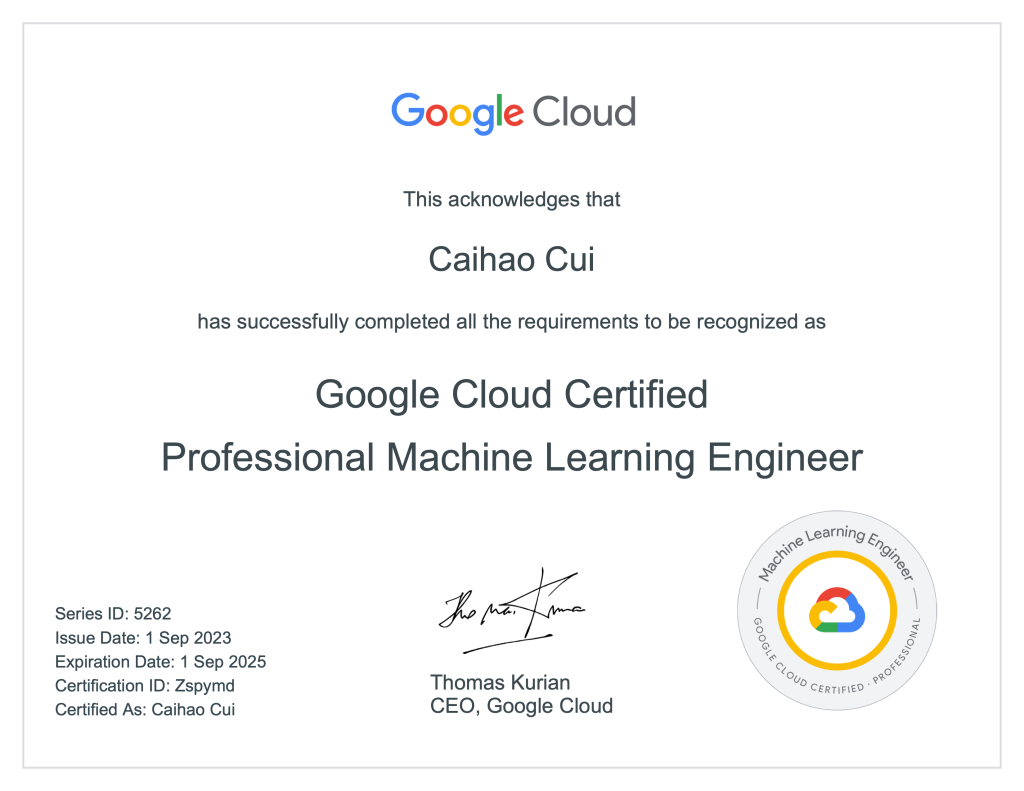Content created by the author and reviewed by GPT.
Obtaining the Google Cloud Professional Machine Learning Engineer (MLE) certification is a remarkable achievement for those interested in a machine learning career. As someone who recently passed the exam, I’m here to share helpful tips and insights about the journey. Whether you’re considering taking the exam or currently preparing for it, I hope this guide will help you with valuable information based on my experience.
Three Steps in Preparation
Step 1: Read the Exam Guide Thoroughly
Before diving into your exam preparation, start by carefully reading the official Exam Guide provided by Google. This document is the roadmap for us to understand the key topics and expectations for the certification.
It’s essential to have a clear grasp of what the exam covers before we begin our study journey. Revisit the ML basics via Google’s Crash Course to clarify the details.
Step 2: Learn Best Practices for Implementing ML on Google Cloud
Machine learning is a dynamic field with various approaches and techniques. Google provides best practices for implementing ML solutions on their platform, and this practical knowledge is invaluable. Learning these best practices will not only help us in the exam but also equip us with the skills necessary for real-world ML projects.
Official Google documents, which include keywords such as best practice, machine learning solution, and data pipeline, are all worth reading.
Step 3: Consult the ExamTopic Website
The ExamTopic website is a valuable resource for exam preparation. However, it’s essential to use it strategically. This resource is not a “cheat sheet” or a “shortcut” to the exam, so save it for later, like after we’ve refreshed our knowledge through reading the official documentation and best practices.
While ExamTopic can provide insights into potential exam questions, remember that there are no official answers. The answers offered on the web and those voted ones by users may not be correct.
Get Ready for Exam and Study Tips
- Exam Online or Onsite
- There are two ways to take the exam: Online and Onsite. If you choose the online option, make sure your home WIFI is stable and your system is checked (webcam, microphone, Secure Browser).
- You will be asked to adjust your device’s security settings, such as turning off the Firewall or enabling screen sharing. If you’re not comfortable making these changes, consider booking an Onsite Exam.
- If any issues arise during the exam, don’t panic! Just contact Kryterion support team through Live Chat. They can help with things like reopening the launch button for you or adjusting the time.
- The key is to stay calm and reach out for help if needed to ensure a smooth exam experience!
- Reading vs. Watching
- In the age of abundant online resources, it’s tempting to jump straight into video tutorials and courses. However, for the best retention of knowledge, start by actively reading Google’s documentation.
- Passive learning through watching videos may lead to omitted details. Reading engages your mind and helps you absorb information effectively.
- Understand Trade-offs
- Machine learning involves making critical decisions, such as balancing speed and accuracy. Take the time to understand the trade-offs involved in various ML solutions. This understanding will prove invaluable not only in the exam but also in real-world ML projects.
- Reading Comprehension
- During the exam, we will encounter questions that provide background information on a problem, stakeholder expectations, and resource limitations. Treat these questions like reading comprehension exercises, as key details hidden within can guide us to the correct answer. Pay close attention to keywords that may hold the solution.
- Time Management
- The exam requires answering 60 questions within a limited timeframe like 2 hours, which may vary in the future. Manage our time wisely by marking questions we’re unsure about for review later.
- Prioritize the questions we can confidently answer first and revisit the marked ones before submitting our exam in the end.
- Stress Management
- Even if you tell yourself not to stress, it’s natural to feel some pressure during the exam.
- Consider conducting simulated practice exams to strengthen your nerves, especially in the case that you haven’t taken any exam for a long time. This practice can help improve your mental preparedness for the actual exam.
In the end, I wish you the best of luck in your journey towards achieving the Google Cloud Professional Machine Learning Engineer certification. Remember that diligent preparation, careful reading, and a strategic approach to resources can significantly enhance your chances of success.
Stay confident, stay focused, and may you pass the exam as soon as possible!
-END-



Encourage the Author to create more useful and interesting articles.
All the money will be donated to the Standford Rural Area Education Program (https://sccei.fsi.stanford.edu/reap) at the end of each Financial Year + my personal donation.
$2.00

